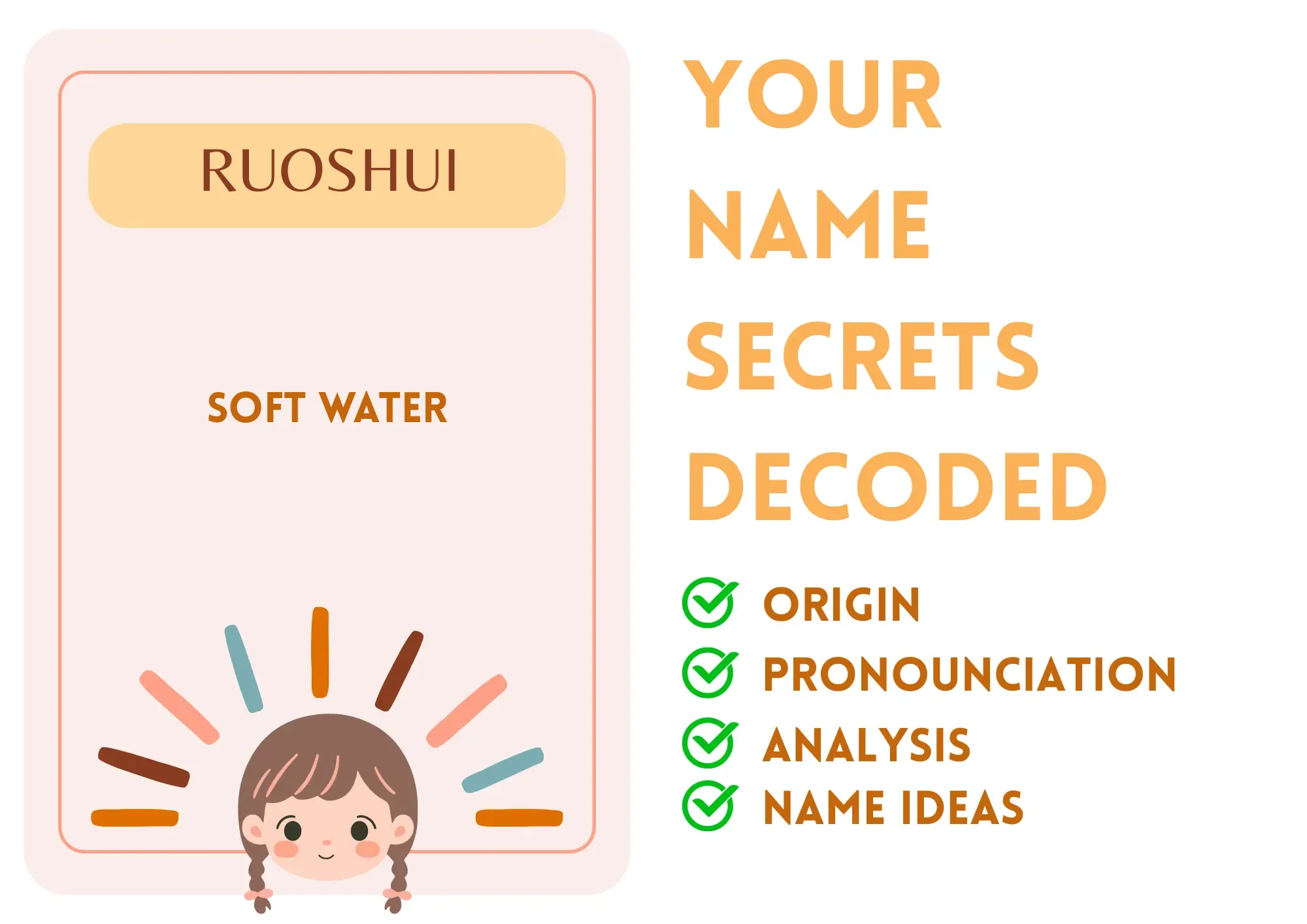
Ruoshui
Ruoshui is a unique and culturally significant name of Chinese origin, meaning 'soft water.' This evocative name embodies qualities of gentleness and flexibility, akin to water's ability to adapt and flow. Ruoshui is predominantly used for females in Chinese-speaking cultures, reflecting traditional feminine qualities linked to nature.
This name resonates deeply within Chinese philosophy, particularly the concept of 'Wu Wei', or effortless action, emphasizing harmony with one's environment. The name Ruoshui signifies grace and adaptability, qualities highly valued in East Asian cultures.
Many people perceive Ruoshui as a beautiful, serene name that evokes calmness and tranquility. It is relatively easy to pronounce for those familiar with Mandarin sounds, although it may pose a challenge for speakers of other languages. Common nicknames might include Ruo or Shui, adding a playful dimension to the name.
Ruoshui does not have notable appearances in mainstream popular culture; however, it could be attractive for characters in literature or film embodying the fluidity and tranquility associated with nature.
Basic Information
Gender: Girl
Sounds Like: ROO-shway
Pronunciation Explanation: The first syllable 'ROO' is pronounced with a long 'oo' sound, and 'shway' rhymes with 'way'.
Summary and Meaning
Meaning: soft water
Origin: The name Ruoshui originates from China, rooted in the Mandarin language and culture.
Usage: Ruoshui is typically a feminine name, embodying attributes traditionally associated with females in Chinese culture.
Name Number (Chaldean)
Name Number (Pythagorean)
Popularity (Global Rank)
Overall: 227580
Girls: 77177
Most Popular in
Religious and Cultural Significance
Religion: Taoism
Background: In Taoism, the name Ruoshui may reflect harmony with nature and the philosophical respect afforded to water as a symbol of adaptability.
Cultural Significance: In Chinese culture, names like Ruoshui are chosen for their poetic meanings, and are believed to influence the personality and life of the bearer positively.
Historical Significance: Ruoshui has historical significance within literary and cultural contexts, symbolizing the flow of life and the importance of adapting to circumstances.
Popular Culture
Literature and Mythology: While specific references in popular culture are rare, the concepts associated with water are prevalent in Chinese literature and philosophy.
Movies and Television: Characters in Chinese films or television might embody the essence of Ruoshui, representing serenity and adaptability, though no specific examples are currently noted.
Feelings and Perceptions
Perception: Ruoshui is viewed positively, seen as a name that evokes beauty, calmness, and grace. It resonates well with those who appreciate nature and serenity.
Positive Feelings: Serene, beautiful, fluid, graceful, adaptable, calm.
Negative Feelings: May be perceived as unfamiliar or complicated by non-Chinese speakers, which could lead to mispronunciation.
Practical Considerations
Ease of Writing and Calling: Ruoshui consists of three syllables and is relatively straightforward to pronounce for speakers of Mandarin. However, it may be less familiar to those unfamiliar with Chinese phonetics.
Common Typos and Misspellings: Ruoshwi,Ruoshu,Ruoshue,Ruoshiy
Common Nicknames: Ruo,Shui,Ru
Ruoshui Popularity
Ruoshui Usage and Popularity By Country
| Country | Rank (Overall) |
|---|---|
| Egypt | 20205 |
| Australia | 68209 |
| France | 72677 |
| United States | 84094 |
| United Kingdom | 90588 |
| Canada | 96992 |
Ruoshui Usage and Popularity By City
| City | Rank (Overall) |
|---|---|
| Peking | 6816 |
| College Station | 2347 |
Compatibility Analysis
Famous Persons Named Ruoshui
No results found for Ruoshui.
Related Names
Similar Sounding Names:
Ruoshi,Sui,Rouxen